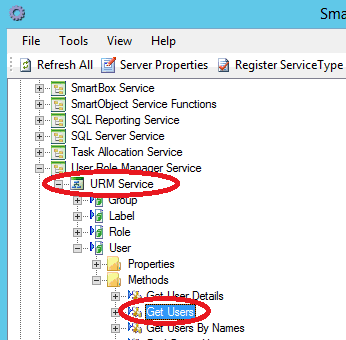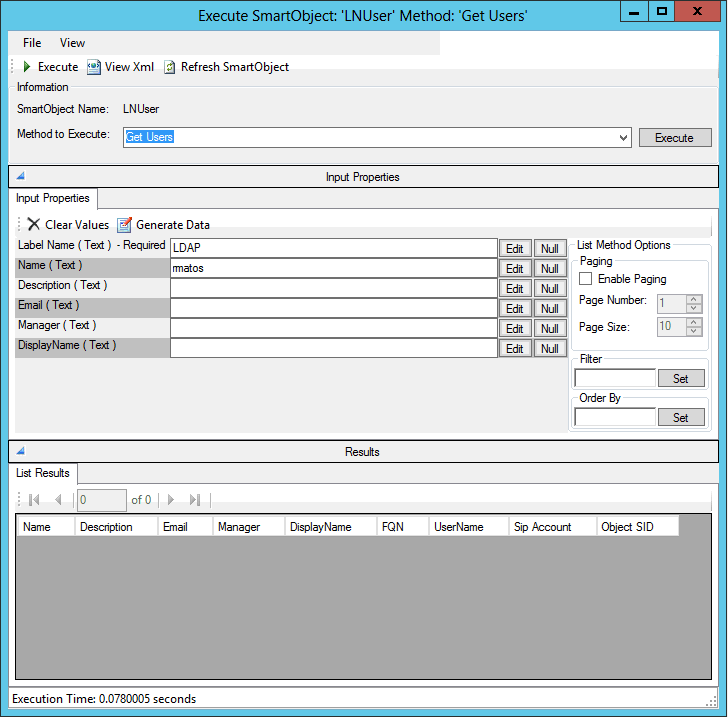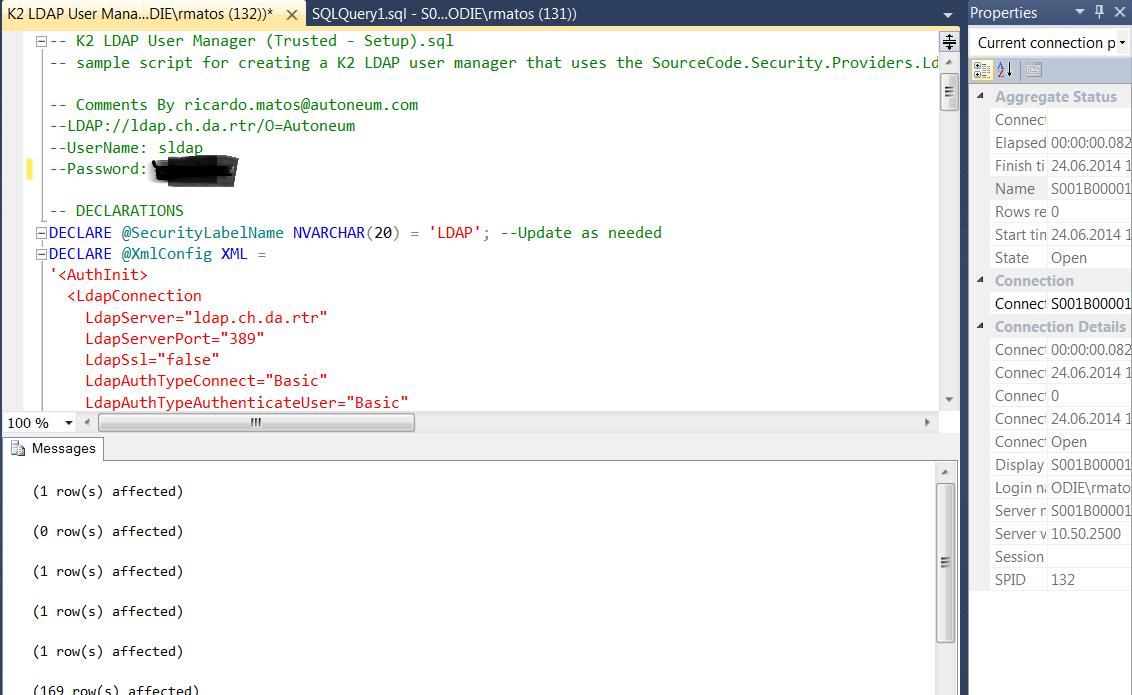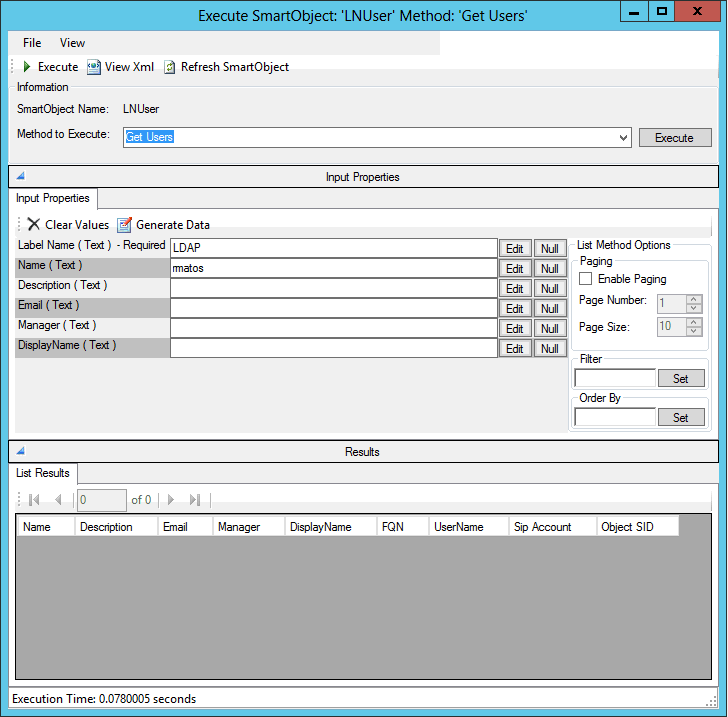Good afternoon all,
in our company we would like to aditionally from authenticating users from active directory also to authenticate via LDAP to Lotus Notes as well.
Regarding the LDAP topic, i found the following article
Here we started by ignoring the Openldap part and focus on the K2 configuration and the usage of the URM service to interact with LDAP:
Basically to connect we need the following settings:
LDAP://ldap.ch.da.rtr/O=Autoneum
UserName: sldap
Password: #########
Based on the original script existing in the mentioned URL, i adjusted it to add the configuration settings above and to update the Identity table in the end.
The scrip is posted bellow:
-- K2 LDAP User Manager (Trusted - Setup).sql
-- sample script for creating a K2 LDAP user manager that uses the SourceCode.Security.Providers.LdapProvider.Trusted.Ldap provider
-- Comments By ricardo.matos@autoneum.com
--LDAP://ldap.ch.da.rtr/O=Autoneum
--UserName: sldap
--Password: #########
-- DECLARATIONS
DECLARE @SecurityLabelName NVARCHAR(20) = 'LDAP'; --Update as needed
DECLARE @XmlConfig XML =
'<AuthInit>
<LdapConnection
LdapServer="ldap.ch.da.rtr"
LdapServerPort="389"
LdapSsl="false"
LdapAuthTypeConnect="Basic"
LdapAuthTypeAuthenticateUser="Basic"
LdapResolveAuthenticationUserToDistinguishedName="true"
LdapAutoBind="false"
LdapScope="Subtree"
LdapConnectIntegrated="true"
LdapConnectUserName="sldap"
LdapConnectUserPassword="#########"
LdapTimeout="0"
LdapProtocolVersion="3"
LdapServerCertificatePath="" />
<LdapUserBaseObject>O=Autoneum</LdapUserBaseObject>
<LdapUserSearchFormatString>(cn={0})</LdapUserSearchFormatString>
<LdapUserGroupSearchFormatString>(memberOf={0})</LdapUserGroupSearchFormatString>
<LdapUserAttributes>
<K2LdapMapping K2Name="ID" LdapName="cn" ObjectType="System.String" />
<K2LdapMapping K2Name="Name" LdapName="cn" ObjectType="System.String" />
<K2LdapMapping K2Name="Description" Multiline="true" LdapName="description" ObjectType="System.String" />
<K2LdapMapping K2Name="Email" LdapName="mail" ObjectType="System.String" />
<K2LdapMapping K2Name="DistinguishedName" LdapName="entryDN" ObjectType="System.String" />
<K2LdapMapping K2Name="ObjectSID" FullOnly="true" LdapName="ibm-entryUUID" ObjectType="System.String" />
<K2LdapMapping K2Name="CommonName" LdapName="cn" ObjectType="System.String" />
<K2LdapMapping K2Name="UserPrincipalName" LdapName="uid" ObjectType="System.String" />
<K2LdapMapping K2Name="Manager" FullOnly="true" LdapName="manager" ObjectType="System.String" SearchQuery="(&(objectClass=Person)(objectCategory=User))" SearchResultProperty="samAccountName" />
<K2LdapMapping K2Name="SipAccount" LdapName="msRTCSIP-PrimaryUserAddress" ObjectType="System.String" />
<K2LdapMapping K2Name="DisplayName" LdapName="displayName" ObjectType="System.String" />
<K2LdapMapping K2Name="TelephoneNumber" LdapName="telephoneNumber" ObjectType="System.String" />
<K2LdapMapping K2Name="Mobile" LdapName="mobile" ObjectType="System.String" />
<K2LdapMapping K2Name="HomePage" LdapName="wWWHomePage" ObjectType="System.String" />
<K2LdapMapping K2Name="FaxNumber" LdapName="facsimileTelephoneNumber" ObjectType="System.String" />
<K2LdapMapping K2Name="HomePhone" LdapName="homePhone" ObjectType="System.String" />
<K2LdapMapping K2Name="IPPhone" LdapName="ipPhone" ObjectType="System.String" />
<K2LdapMapping K2Name="StreetAddress" LdapName="streetAddress" ObjectType="System.String" />
<K2LdapMapping K2Name="City" LdapName="l" ObjectType="System.String" />
<K2LdapMapping K2Name="Country" LdapName="c" ObjectType="System.String" />
<K2LdapMapping K2Name="State" LdapName="st" ObjectType="System.String" />
<K2LdapMapping K2Name="Title" LdapName="title" ObjectType="System.String" />
<K2LdapMapping K2Name="Department" LdapName="department" ObjectType="System.String" />
<K2LdapMapping K2Name="Company" LdapName="company" ObjectType="System.String" />
<K2LdapMapping K2Name="Office" LdapName="physicalDeliveryOfficeName" ObjectType="System.String" />
<K2LdapMapping K2Name="ManagedUsers" FullOnly="true" LdapName="managedUsers" SearchQuery="(&(objectClass=Person)(objectCategory=User))" SearchResultProperty="samAccountName" ObjectType="System.Collections.ArrayList" />
<K2LdapMapping K2Name="Groups" FullOnly="true" LdapName="memberOf" SearchQuery="(objectCategory=Group)" SearchResultProperty="samAccountName" ObjectType="System.Collections.ArrayList" />
</LdapUserAttributes>
<LdapGroupBaseObject>dc=maxcrc,dc=com</LdapGroupBaseObject>
<LdapGroupSearchFormatString>(cn={0})</LdapGroupSearchFormatString>
<LdapGroupMemberSearchFormatString>(member={0})</LdapGroupMemberSearchFormatString>
<LdapGroupAttributes>
<K2LdapMapping K2Name="ID" LdapName="cn" ObjectType="System.String" />
<K2LdapMapping K2Name="Name" LdapName="cn" ObjectType="System.String" />
<K2LdapMapping K2Name="Description" Multiline="true" LdapName="description" ObjectType="System.String" />
<K2LdapMapping K2Name="Email" LdapName="mail" ObjectType="System.String" />
<K2LdapMapping K2Name="DistinguishedName" LdapName="entryDN" FullOnly="true" ObjectType="System.String" />
<K2LdapMapping K2Name="ObjectSID" LdapName="ibm-entryUUID" FullOnly="true" ObjectType="System.String" />
<K2LdapMapping K2Name="Member" LdapName="member" FullOnly="true" SearchQuery="(&(objectCategory=Person)(objectCategory=User))" SearchResultProperty="cn" ObjectType="System.Collections.ArrayList" />
</LdapGroupAttributes>
</AuthInit>' -- XML configuration for the LDAP provider, see K2 Help for more information on configuration values
DECLARE @SecurityLabelID UNIQUEIDENTIFIER = NEWID(); --Assigning new GUID
DECLARE @AuthSecurityProviderID UNIQUEIDENTIFIER = NEWID(); --Assigning new GUID
DECLARE @AuthInit XML = @XmlConfig;
DECLARE @RoleSecurityProviderID UNIQUEIDENTIFIER = @AuthSecurityProviderID;
DECLARE @RoleInit XML = @XmlConfig;
DECLARE @DefaultLabel BIT = NULL; --1 = true, NULL and 0 = false
DECLARE @ProviderClassName NVARCHAR(200) = 'SourceCode.Security.Providers.LdapProvider.Trusted.Ldap';
DECLARE @SPProviderID UNIQUEIDENTIFIER;
-- UPDATE TABLES
USE rK2TST]
DELETE FROM TSecurityProviders] WHERE ProviderClassName = @ProviderClassName;
DELETE FROM TSecurityLabels] WHERE SecurityLabelName = @SecurityLabelName;
INSERT INTO RSecurityProviders] VALUES (@AuthSecurityProviderID, @ProviderClassName);
INSERT INTO RSecurityLabels] VALUES (@SecurityLabelID, @SecurityLabelName, @AuthSecurityProviderID, @AuthInit, @RoleSecurityProviderID, @RoleInit, @DefaultLabel)
SELECT @SPProviderID = dSecurityProviderId] FROM dSecurityProviders] WHERE ]ProviderClassName] = N'SourceCode.Security.Providers.SharePoint.SharePointProvider'
IF NOT EXISTS (SELECT 1 FROM GroupProvider] WHERE ]SecurityLabelID] = @SecurityLabelID)
BEGIN
INSERT INTO RGroupProvider]
(
>GroupProviderID]
,]SecurityLabelID]
,]SecurityProviderID]
,]Name]
,]Init]
)
VALUES
(
NEWID()
,@SecurityLabelID
,@SPProviderID
,'*'
,'<init><label name="SP" /></init>'
)
END
UPDATE Identity].IIdentity]
SET /ExpireOn] = GETDATE()
,(Resolved] = 0
, ContainersResolved] = 0
, ContainersExpireOn] = GETDATE()
,(MembersResolved] = 0
, MembersExpireOn] = GETDATE()
GO
However when i query a URM Service based Smart Object no results are returned:


Any ideas to mek this work?
Thank you in advance.



